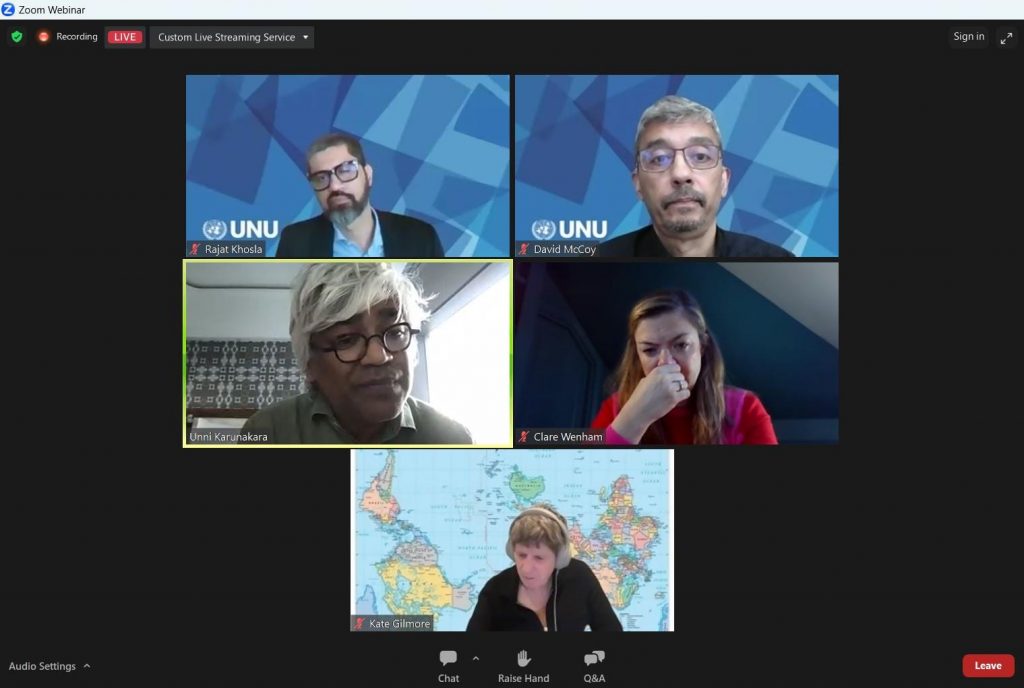A Deep Dive into Global Health Security: Reflections
Dr Preeti Chauhan (Department Head – National Policy, Pallium India) writes:

On Thursday, 14th December 2024, I had the opportunity to attend a thought-provoking webinar organized by the International Institute for Global Health, United Nations University, Kuala Lumpur, Malaysia. The webinar centered around the launch of a paper on ‘Global Health Security and the Health-Security Nexus: Principles, Politics and Praxis’.
The webinar highlighted the steady increase in references to ‘security’ by health academics, policymakers, and practitioners over the past four decades, particularly in relation to threats posed by infectious disease pandemics. Despite the dominant health security discourse, the many different ways in which health and security issues intersect have remained largely unassessed and unpacked in current critical global health scholarship.
The webinar discussed the emerging and growing health-security nexus in the wake of COVID-19 and the international focus on global health security. It presented two contrasting approaches to health security: neo-colonial health security and universal health security.
The neo-colonial health security approach focuses on the security of populations and economic systems in high-income states, often overlooking the health security needs of low-income states. On the other hand, the universal health security approach advocates for equitable health security practices across all nations, regardless of their economic status.
The webinar also introduced a novel heuristic that delineates the multiple intersections and entanglements between health and security actors and agendas. This heuristic aims to broaden our conceptualization of global health security configurations and practices. It also highlights the potential for harmful unintended consequences, the erosion of global health norms and values, and the risk of health actors being co-opted by the security sector.
The COVID-19 pandemic has exposed global inequities in health security practices and served as a catalyst for readdressing understandings of health and security. The webinar emphasized the need for critical analyses of perspectives of health and security, which have remained scant in global health scholarship, despite the ubiquity of the term health security.
The webinar was graced by the presence of several esteemed speakers, each bringing their unique perspectives to the discussion. The panel included Unni Karunakara, former international president of Doctors Without Borders (MSF), Kate Gilmore, former deputy high commissioner for human rights, Clare Wenham, Professor of global health policy at the London School of Economics, David McCoy, professor at the International Institute for Global Health, United Nations University, Kuala Lumpur, Malaysia, and Rajat Khosla, the director of UNU, who served as the moderator.
Mr. Unni Karunakara emphasized the importance of local and regional capacity correction rather than de-globalization. He advocated for empowering regions to respond and protect their citizens effectively.
Kate Gilmore brought attention to the need for non-discrimination, equality, and dignity in health security. She criticized the toxic nature of the term ‘security’, which often prioritizes political popularity over human health and the future of our planet. She called for a global common approach to ensure fair and equal benefits for all under good global governance.
Professor Clare Wenham discussed the increasing securitization and interference of global governance. She cautioned against naivety and stressed the importance of data gathering. She also warned about potential vested interests among African CDC funders, as witnessed during the Ebola outbreak. She argued that a securitized response to health is precarious and politicizes the issue, detracting from the importance of the global health population.
The speakers also highlighted the need for courage and reflection to recalibrate our approach to face the formidable challenges that lie ahead. They called for action and accountability, hoping for some global action with responsibility.
In conclusion, the webinar served as a platform for critical discussions on global health security. It underscored the need for a collective restructuring of the global health security agenda in the wake of COVID-19. The discussions presented both threats and opportunities for better and fairer global health security, making it a must-attend for anyone interested in the future of global health.
For more details, you can refer to the paper ‘Global Health Security and the Health-Security Nexus: Principles, Politics and Praxis’ published in BMJ Global Health linked below:






